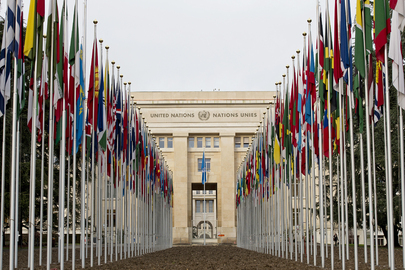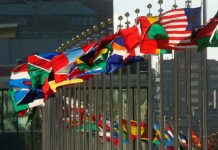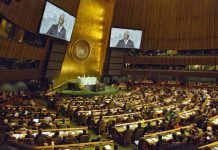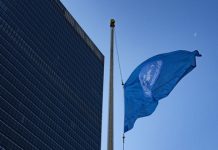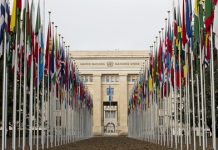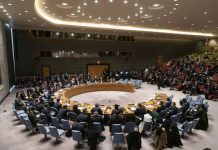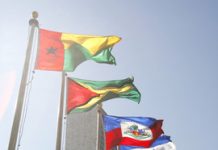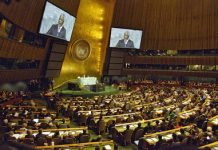Vibhu Mishra, UN News: When we spoke last year, you highlighted the kinds of allegations that you’re looking into: crimes against the Rohingya, attacks against civilians, political violence and many more. A year on, what are your impressions? What has changed? Are things improving or going the other way?
Nicholas Koumjian, IIMM: Well, very unfortunately, I regret to report that the situation is getting worse. More crimes are occurring. More people are suffering. More people are displaced, and many are dying.
UN News: Looking at certain aspects, we see new actors emerging, new alliances forming among the armed groups. Would you like to comment on any of that?
Mr. Koumjian: Well, clearly, the level of armed conflict in the country is only increasing. We’ve seen that the armed groups, particularly the ethnic armed groups, have been able to capture much territory outside the very center of Myanmar. And the response, the way that the fighting is being done, particularly by the military, is very brutal. We see airstrikes hitting civilian areas and many people dying from that. But also, I have to say that we’re greatly concerned from many of the reports and even videos that we have been able to obtain that show, very serious crimes done by opposition forces. So, all of this we’re looking at.
UN News: You also told us about your work in gathering evidence, key aspects of information. Has there been any progress in their use?
Mr. Koumjian: Well, so far, there are only three judicial processes that are using our information, which isn’t such a bad record. But the three processes are the International Criminal Court, which has an investigation ongoing about what happened to the Rohingya. And based upon the fact that Rohingya were displaced from Myanmar and forced over the border to Bangladesh, a state party to the ICC. Second case has been ongoing. An investigation in Argentina, where Rohingya from the United Kingdom and in the camps in Bangladesh filed a complaint and the Argentine court said, because these were crimes against humanity. The court had an obligation under the Argentine constitution to investigate. So that investigation is ongoing, and the prosecutor has requested arrest warrants. And the third judicial process that we’re cooperating with is the case at the International Court of Justice. That, of course, is the case where the Gambia, the small Muslim country in Africa, filed this case, alleging that Myanmar has failed to fulfill its obligations under the convention for the Prevention and Punishment of genocide, in that they hadn’t punished anyone, and they failed to prevent genocide against the Rohingya. But I would say that all three of these processes only deal with the Rohingya. We don’t yet have an ongoing process to share about all the crimes in the other parts of the country and all the post-coup violence.
UN News: You spoke about the post-coup violence and violence in other parts of the country. We have seen in the new especially in the northeast and some other rural areas of brutal attacks by the Tatmadaw, including aerial attacks, heavy bombardments. Would you like to elaborate on that?
Mr. Koumjian: Well, that’s something that we’re examining. Aerial attacks that target civilians or aerial attacks that clearly have a disproportionate effect on civilians compared to the military objective are not permitted under international law. So, we’re looking at those. And there was a lot of evidence about those sometimes videos of the damage done, of the injuries that occurred. Sometimes we have information on the weapons used. So, all of that is under examination.
UN News: And what about other grave violations, things that happened behind closed doors like torture during detentions?
Mr. Koumjian: That’s something we place a high priority on particularly. We’ve seen in a lot of the detentions, sexual violence, sexual violence against both men and women and all genders, rapes, threats of rape as a means of torture to try to coerce information, actual rapes or bodily penetration. So, we place a high priority on gathering that evidence because we know that sexual violence occurs often in conflicts and it’s almost always very underreported and under prosecuted. So, when we get that evidence and we have obtained evidence, including directly from victims, we place a high priority on that.
UN News: Your team is working on some very, very difficult situations. Would you like to speak a little bit about your ongoing work, how you see this progress over the next year?
Mr. Koumjian: Well, I think we’re excited about the ongoing processes, and we think there’s going to be over the next year, we’re going to see progress in the in the case at the International Court of Justice. Myanmar has a deadline in December to file the final written submission, and then we would expect oral hearings to start next. Last year. The International Criminal Court, I can say, is very active. Our teams, our Rohingya team and their Rohingya team talk regularly. And, you know, I think based upon all the action that I expect some results next year on that. And the case in Argentina, we know that the investigating prosecutor has already requested that the judge issue warrants of arrest. So, we’ll see what happens on that next year.
UN News: You also mentioned just briefly that the cases that are ongoing so far are predominantly concerning the Rohingya, but nothing much has been going on since the coup. What do you think would take on part of the international community to get some traction there?
Mr. Koumjian: Well, all of the ongoing those three processes only deal with the Rohingya, so we don’t have anything outside the Rohingya. And I think it’d be very important for the people of Myanmar to show that we’re of course, concerned with crimes against anybody, any ethnicity. We don’t care what is their religion, the nationality or the politics of either the victim or the perpetrator. If human beings are being targeted through international crimes in Myanmar, we will investigate and gather the evidence. But there needs to be a court that will go to perhaps you and I’m very hopeful that someday those will be the courts of Myanmar that will hear some of these cases. But in the meantime, we know there have been some complaints filed around the world. They haven’t yet been successful in getting courts to pick it up, but courts could pick up these cases based on international universal jurisdiction. And, we know that some of the victims of crimes were nationals of other countries, and that can be a basis under national laws for jurisdiction. And it’s always possible that perpetrators will be on the territory of other states, in which case those states may possibly, under their laws, be able to exercise jurisdiction. So, we’re, of course, looking at all of that. If we believe that a case is promising for national jurisdiction, we will contact and speak to the jurisdiction about that. And then there’s always the possibility that the international community would set up some process for the crimes in Myanmar, either through the International Criminal Court, which would require a referral from the Security Council, or a tribunal set up specifically for Myanmar.
UN News: Let me go off on a little tangent here. You have a very distinguished career in criminal prosecutions. You used the phrase “universal jurisdiction” quite a few times. Can you tell us what that really means?
Mr. Koumjian: Well, most countries under their laws have jurisdiction according to their laws for crimes that happen on their territory. But universal jurisdiction is a term that’s used to describe when a country says it will have jurisdiction over these most serious international crimes, even if it’s not on their territory. And there are various variations of how this could be written into legislation. Some countries, like Argentina, require no link to the country at all. Others require some link, such as the victim is a national of that country or the perpetrator is a national of that country. So, there’s various types of, you know, universal jurisdiction. But the basic idea is that for the most serious international crimes, a country’s courts would exercise jurisdiction, even though the crime happened on the territory of another country.
UN News: You are right now in New York, and you will be presenting your report to the General Assembly that all 193 Member States are represented. What is your message to them and to the members of the Security Council? What is your call to action?
Mr. Koumjian: Our mechanism is set up to deal with one aspect of the problem, and that is impunity, because I believe the Human Rights Council, when they established us, they recognize that what happened to the Rohingya wasn’t unique in Myanmar. Similar targeting of civilians had happened in other conflicts for decades in Myanmar to other ethnic groups. And I think now everyone in Myanmar, including the Bamar majority, recognize that what the military is doing to them is not tolerable. And we need to break this cycle of those in power believing they can commit such crimes without facing responsibility. So, we ask the international community to help us, help us by not only continuing our mandate and funding our activities, but also, it’s important that states allow us to operate in their territory, to go there, to interview witnesses, to gather evidence. And we believe that together we will help to break this cycle of impunity.
UN News: Those were the questions that I had. Before we conclude, do you have any thoughts, any personal reflections?
Mr. Koumjian: I would just say to the victims of Myanmar. I know. The people of Myanmar. We understand how difficult the situation is. We understand how frustrating it must be knowing that international justice is very slow. But we’ll continue to fight. We’ll continue to gather that evidence, and we hope one day there’ll be some measure of justice for these victims.
Source of original article: United Nations (news.un.org). Photo credit: UN. The content of this article does not necessarily reflect the views or opinion of Global Diaspora News (www.globaldiasporanews.com).
To submit your press release: (https://www.globaldiasporanews.com/pr).
To advertise on Global Diaspora News: (www.globaldiasporanews.com/ads).
Sign up to Global Diaspora News newsletter (https://www.globaldiasporanews.com/newsletter/) to start receiving updates and opportunities directly in your email inbox for free.


